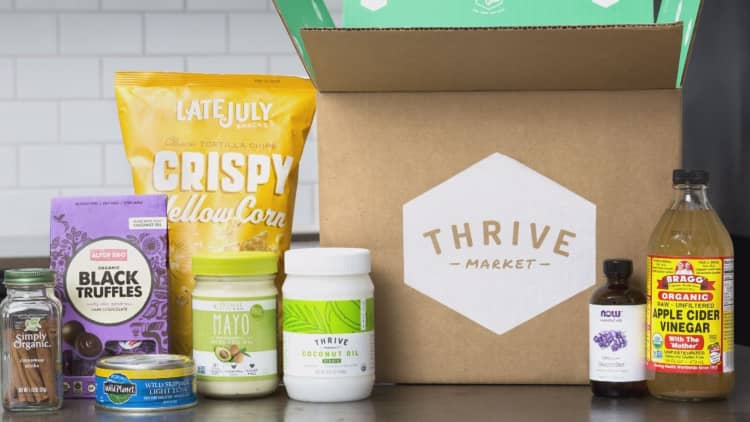
Eating healthy can be pricey.
A 2015 study by Consumer Reports found that organic food was, on average, nearly 50 percent more expensive than non-organic options. Still, that hasn't deterred consumers from flocking to healthier foods, and those that sell them.
If shoppers are looking for food that is either organic, gluten-free, non-GMO and they're not in a major city, healthy options can be not only expensive, but also difficult to find.
One startup is trying to change that dynamic. Thrive Market, which sells non-perishable healthy foods at comparatively reasonable prices, will ship customer orders within two days to 85 percent of the country.
"Our idea is to make healthy living affordable and accessible for anyone," Thrive Market co-CEO Nick Green told CNBC's "On The Money" in an interview.
Conceived as a kind of online-only Whole Foods combined with a Costco-like warehouse club model, Green and fellow co-founder Gunnar Lovelace created the organic delivery company just two years ago.
"We offer natural and organic products, shelf-stable products you put in your pantry…that are 25 to 50 percent off what you find in a conventional retail store," Green told CNBC.
Thrive Market charges $60 for an annual membership and Green said there are "more than 350,000 paid members on the site." He said the cost savings are achieved because of the membership model, and the fact they buy direct from suppliers—eliminating the middleman.
Using two warehouses—one in Batesville, Indiana and the other in Reno, Nevada—Green said "we deliver anywhere in the country and we ship via UPS and FedEx ."
When you think organic food, you might think or fruits, vegetables and dairy, but Thrive Market actually carries none of that. Thrive caters to consumers by selling snacks, cooking supplies and toiletries.
"It's really anything that doesn't go in your refrigerator, but might go in your pantry," Green said. He argued that many shoppers spend more than they think on household staples, and those savings can easily be diverted to buying other things.
"A lot of people don't realize, over 45 percent of your groceries are non-perishable," Green explained, making the case for Thrive's business model.
"So if you save on that half, it leaves you a lot more to spend on high quality produce on the other half. Green suggested members utilize local farmers markets to acquire produce and other perishables.
Green said Thrive has "about 4,000 products" on its website, "but you can click on, and filter one or more 'values' that are important to you," he said.
"We actually tag every single product that comes on the site. If they want it to be fair trade, and vegan, and a carbon-neutral company," Green said. Users can click on those specific values and "you literally can sort the entire catalog depending on what you're looking for. So where are those customers purchasing from?
"One of the interesting things is we are not targeting the coastal cities, about half of our membership is based in the Midwest and the Southeast in markets that are traditionally under-consumers of natural and organic products," he said.
On the Money airs on CNBC Saturday at 5:30 am ET, or check listings for air times in local markets.



